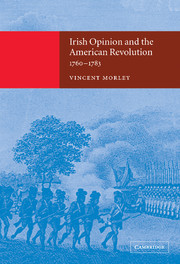3 - International war, 1778–1781
Published online by Cambridge University Press: 17 July 2009
Summary
Irish Protestants appeared to have found a new sense of unity in the early months of 1778 – a feeling inspired not only by the reappearance of a historic and ‘natural’ enemy in the form of Catholic France, but also by the belated adoption of conciliatory policies towards the American colonies by Lord North's ministry. The effective dropping of the British parliament's claim to tax the colonies resolved a central issue on which most members of the Irish political nation had sympathised to some extent with the Americans, even as the threat of a European war increasingly overshadowed the distant conflict in America. But divisions of opinion on America persisted in a less acute form. If some Protestants felt that British concessions on the taxation issue provided a realistic basis for reconciliation with the colonies, others believed that American independence was a fait accompli which should be recognised as soon as possible in order to release resources for the critical struggle against France.
The French war also had some potential to narrow the political gulf that had opened up between élite and popular strata of Catholic society since the 1760s. For the latter, war with France raised expectations that the long-predicted liberation of Ireland was finally at hand and consolidated pro-American sympathies which were already apparent. For Catholics of property, however, the Franco-American alliance represented something of a dilemma.
- Type
- Chapter
- Information
- Irish Opinion and the American Revolution, 1760–1783 , pp. 170 - 276Publisher: Cambridge University PressPrint publication year: 2002

